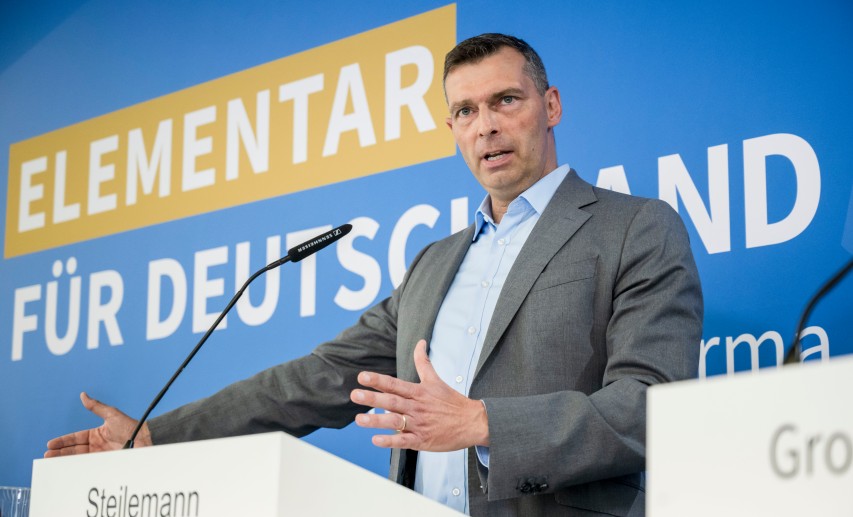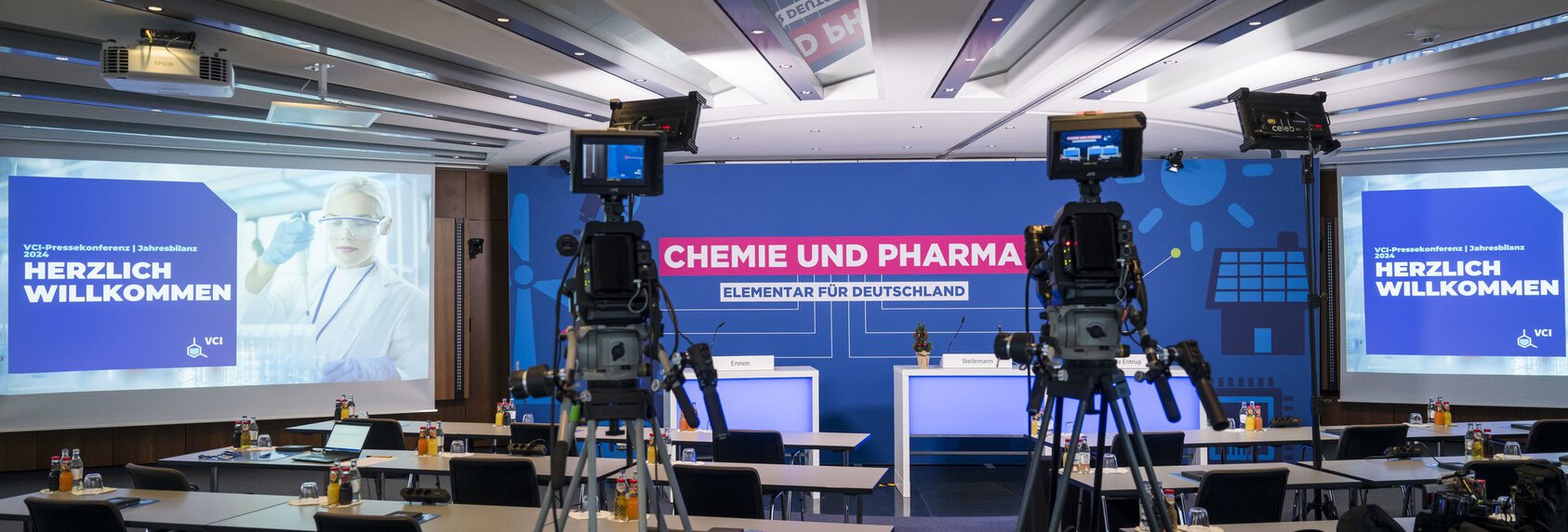21 July 2023 | Pressemitteilung
LanguageDEDownloads
-
Key Figures
PDF | 277 kB | Version as of: 21 July 2023
Half-year results are disappointing for the German chemical-pharmaceutical industry.

Hopes for a recovery after the mild winter and with much lower gas and electricity prices have not materialised. Quite the contrary: “The demand for chemicals is on the decline. The figures for the first half of the year are in the red, and production costs at the industry location Germany are not competitive,” so Markus Steilemann, President of the German chemical industry association Verband der Chemischen Industrie (VCI) on the current situation. Against this backdrop, the VCI is making a downward correction of its annual forecast.
Production in the first six months of 2023 was 10.5 percent lower than last year. When excluding the pharmaceuticals business, the output drop was even 16.5 percent. At 77 percent on average, capacity was underutilised. Although pharmaceutical production remained stable against the previous year, there are already clear signs of a slowdown in this field, too.
Basic chemicals sectors continued to see declines in the double-digit range. The output of inorganic basic chemicals was roughly 26 percent lower in the annual comparison. The downturn was also marked for petrochemicals (-21 percent) and polymers (-19 percent). While there were sharp production cuts for consumer-related chemicals and hygiene and surface protection products (-12 percent), the drop in the production of fine and specialty chemicals was comparatively moderate (-6 percent).
Slump in orders
Incoming orders in the chemical-pharmaceutical industry have been falling almost continuously for more than a year, order backlogs are dwindling, and the industry’s sales declined significantly both in Germany and abroad. At 114 billion euros, first-half proceeds in the chemical-pharmaceutical industry were 11.5 percent below the previous year's level. Domestic sales plummeted by 15.5 percent. Foreign business also went down considerably by -8.5 percent.
The sales decline in the first half 2023 comes with the persistently difficult earnings situation of companies. According to a survey among the VCI membership, almost two thirds reported falling profits or even losses. High price pressure contributed to the poor earnings situation, as chemical prices came under pressure irrespective of high production costs. But in the period under review, chemical prices overall were still 5 percent higher than in the previous year.
No hopes for the second half 2023
In view of the weak business situation of industry generally, the VCI assumes a drop in production by 8 percent for 2023 as a whole. When excluding the pharmaceuticals business, the output of chemicals should decline by 11 percent. With falling prices overall, the industry’s sales are likely to go down by 14 percent. In this setting, the export business (-12 percent) is hardly doing any better than domestic sales (-17 percent).
There are enormous challenges to the companies. Here, the slow economy is not the major problem. The recent membership survey shows that the structural deficits in Germany are another cause for concern. Steilemann notes: “Confidence in Germany as a business location is fading. We are not notorious doomsayers. But the compounded risk of high energy prices and company taxes, poor infrastructure, skills shortages, insufficient progress in digitalisation and bureaucracy madness is destroying the faith of our entrepreneurs.” In particular, almost 90 percent of companies rate the energy costs as bad or very bad in an international comparison.
This is no surprise, as the chemical industry depends on competitive electricity prices. Even though the electricity costs have fallen, they are still above the pre-crisis level when they already posed a decisive disadvantage for the location. Steilemann states: “For this reason, we are fighting for an industrial electricity price as a bridge to the future – until we have enough energy from renewables. Only then can we hold our own in international competition.”
The planned abolition of the tax relief measure called “Spitzenausgleich” will bring yet more problems for energy-intensive industrial companies: ca. 1.5 billion euros p.a. more in electricity tax. This is an extra burden for an already struggling industry.
Germany is squandering its strengths
According to the VCI survey, 80 percent of companies rate the cost and workload for bureaucracy and regulation as a significant location disadvantage. Never before has this rating been so negative. The picture is also bleak for many other location factors, such as licensing procedures. This makes itself felt especially in the expansion of renewable energies.
Ultimately, the current situation endangers both the trans-formation to climate neutrality and the competitiveness of German industry. Markus Steilemann explains: “This is about a knock-on effect where we are the first to wobble. If we are doing badly at the beginning of the value chain, others will follow soon”. Maintaining a strong chemical industry in Germany is essential for structural change to come about in the first place. High-tech chemicals from Germany are enablers, for example, for battery technology and also for chips and semiconductors and the energy and mobility transition.
Politicians must act – not argue
The economic and structural shortcomings of Germany as a business location can no longer be dismissed. Steilemann concludes: "That is why the government coalition is now called upon to act as quickly as possible to prevent, figuratively speaking, that Germany becomes a candidate for relegation.”
An “Offensive 2030” should get the industry location in good shape, so that German industry can succeed in the global competition for the markets of the future.
From the VCI’s perspective, a reform should ensure the following:
- Germany has reliable supply of energy and raw materials as well as competitive prices for electricity and gas.
- The bureaucracy madness comes to an end to enable the necessary speed in licensing procedures.
- There is deregulation at national and European levels that creates scope to find entrepreneurial solutions to the challenges ahead.
- Germany is an attractive location for domestic and foreign staff and investors and also for domestic production and imports.
- Germany returns to a stronger European approach: Only the voice of an economically strong Europe will heard in international politics.
The VCI and its sector associations represent the interests of around 1,900 companies from the chemical-pharmaceutical industry and related sectors vis-à-vis politicians, public authorities, other industries, science and media. In 2022, the VCI member companies realised sales of ca. 260 billion euros and employed nearly 550,000 staff. Contact: VCI Press Department, phone: +49 69 2556-1496, e-mail:
presse@vci.de
VCI on X
